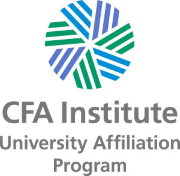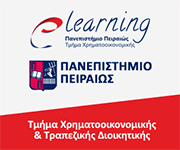Mathematics II (2018-19)
Course Name: Mathematics II
Teacher: Michalis Anthropelos
School: Finance and Statistics
Department: Banking and Financial Management
Level: Undergraduate
Course ID: ΧΡΜΑΘ07 Semester: 2nd
Course Type: Mathematics I
Prerequisites: –
Teaching and Exams Language: Greek
Course Availability to Erasmus Students: Yes (in Greek)
Course webpage:
Specific Teaching Activities |
Weekly Teaching Hours |
Credit Units |
Lectures |
4 |
6 |
Course Content
First section
Linear Algebra
- Calculations with matrices
- Systems of linear equations and inverting matrices
- Inner product
- Transposition and quadratic forms
Second section
Functions with several variables
- Partial derivatives
- Implicit differentiation
- Optimization with several variables
- Optimization with constrains
Third section
Differential equations
- Linear equations with constant coefficients
- Second order ordinary and partial differential equations
Teaching Results
The goal of this course is to teach students the mathematical skills they need in order to deal with basic and more advance problems of economics. The course provides an introduction to the mathematical concepts and methods used in economics and covers material from calculus, matrix algebra and optimization theory. Besides the theory, several applications are developed for many different branches of economics and finance.
Upon successful completion of the course students will be able to:
use the knowledge of mathematical analysis to create and use models on financial and investment issues. They will also be able to research and further deepen to applied mathematics in the economic sciences, as well as be able to apply mathematical results, and with the use of computers, to find solutions to economic and financial issues.
Skills
Autonomous work
Team work
Work in inter-scientific environment
Adjustment in new conditions
Teaching and Learning Methods - Evaluation
Lecture: Face-to-Face teaching
Use of Information and Communication Technologies: E-class platform support
Teaching Analysis:
Activity |
Semester Workload |
Lectures |
26 |
Teamwork |
29 |
Autonomous Study |
95 |
Total |
150 |
Student Evaluation:
Writing exams (90%) that refers to the theoretical questions and exercises on the material developed in the class.
Homeworks (10%) that ask students to solve some related to the course exercises.
Recommended Bibliography
• “Mathematics for Economists: An Introductory Textbook”, M. Pemberton and N. Rau.
• “Maths for Economics”, G. Renshaw.




